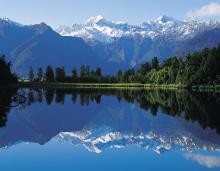Auckland, New Zealand
This program will visit important sites where North Island Māori communities and the New Zealand nation-state confront issues around language, environment, and indigeneity. Similar to the experiences of other indigenous peoples ongoing confrontations with the state around issues of cultural maintenance and maintaining connection to traditional lands frames Māori relations with the settler-colonial state and issues around critical indigenous rights to culture, resources, livelihoods, and authority. Unique to Aotearoa (New Zealand), however, is the Waitangi Tribunal, a government commission that investigates and adjudicates treaty claims raised by Māori communities against the state. Often hinging on cultural and historical evidence, many of these cases involve land and sea claims and access and control over natural resources. By interacting with Māori scholars and leaders and visiting sites related to the Treaty of Waitangi, key tribunal cases, and cultural representation, students will gain a deeper understanding of how these themes shape indigenous and state interactions in a settler-colonial context on the other side of the Pacific. After arriving in Auckland, we will spend the first week working with faculty at the University of Auckland and Māori community members in the Greater Auckland area to situate the students within the Aotearoa/New Zealand experience. During this week we will interact with faculty and students at the University of Auckland and visiting important sites of cultural representation, including the Auckland War Memorial Museum, an immersion Māori language school, and an urban Māori radio station. After this we will take a bus to Rotorua in the Bay of Plenty, where we will tour some important historic and cultural sites, with a side trip to the Maori Arts Crafts Institute at Te Puia in Rotorua, a geothermal region of the North Island. From there where will bus to Hawkes Bay. We will spend the rest of the week there interacting with the local Māori community exploring how the key issues underpinning the trip - language, environment, and indigeneity – play out in the context of local Māori communities. This is where Dr. Barcham’s home community is based which thus provides a unequalled degree of access to the lived experience of a Māori community. This section of the trip will include visits to the Ngāti Kahungunu tribal government buildings, to the Taiwhenua o Heretaunga community government center, to various sites of local environmental and cultural revitalization. A highlight will be an overnight stay at Kohupatiki Marae (Ngāti Hori) – Dr. Barcham’s home community. We will then take a bus down to Wellington, the capital of New Zealand. We will spend our final full week visiting the headquarters of the Waitangi Tribunal and Te Papa Tongarewa, the Museum of New Zealand, as well as the offices of Te Taura Whiri (the Māori Language Commission), Te Puni Kokiri (the New Zealand Ministry of Māori Development), New Zealand Parliament to meet with Māori members of Parliament and the New Zealand Ministry for the Environment. The program features extensive collaboration with local communities, including group meetings/class sessions, communal dinners, and exchange opportunities with Māori students, experts, and communities. Additionally, we will explore Auckland and Wellington, two dynamic and beautiful Pacific cities. By the end of the trip, students will have a greater appreciation and understanding of indigenous issues of language, environment, and indigeneity.
- CHID 476 / AIS 375: Language, Environment, and Indigeneity in Aotearoa/New Zealand
*Note that the fees stated above do not include some additional costs, including, but not limited to: airfare, UW Student Abroad Insurance ($1.64/day), and personal spending money. Remember that these costs will differ by program. Be sure to read our Fees, Financing, and Withdrawal information for details about the fee structure and payment schedule.
